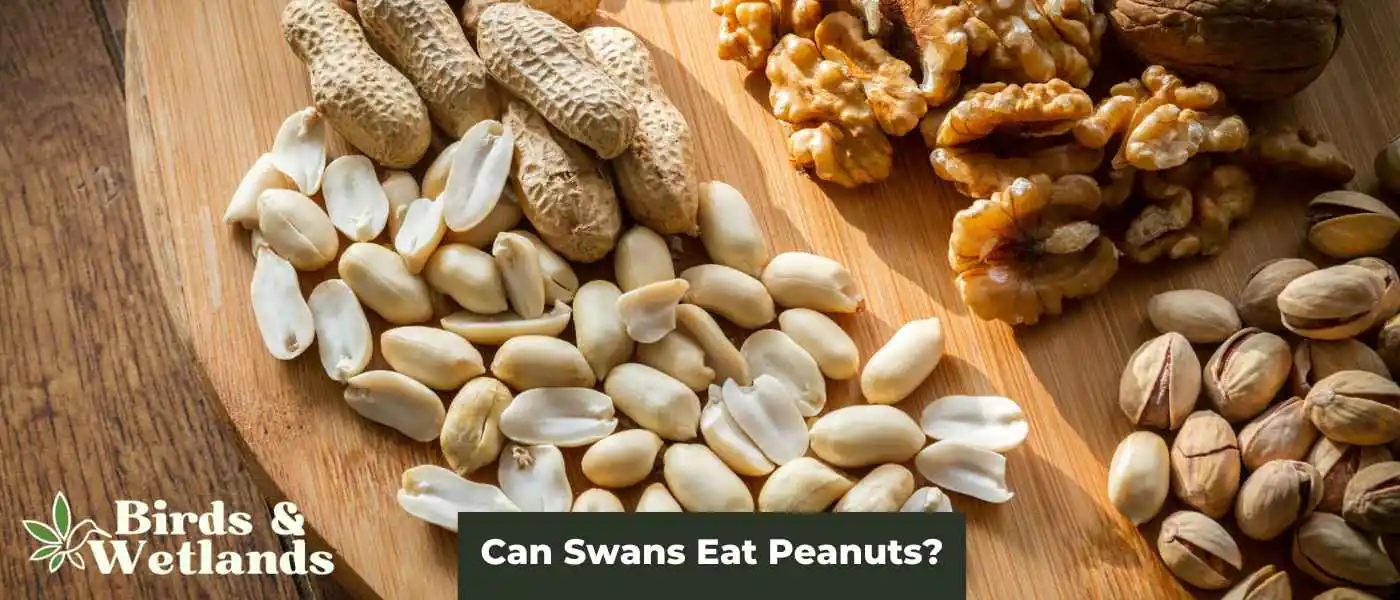Swans are herbivorous birds that primarily consume aquatic vegetation like algae, duckweed, and water lilies.
However, many people enjoy feeding swans with human food, including peanuts. While peanuts may seem like a harmless snack, it is important to consider whether they are safe for swans to consume.
So let’s find out, can swans eat peanuts?
While swans can eat peanuts, it is important to ensure they are fed in moderation and properly chopped or ground. Feeding swans too many peanuts can lead to health issues such as obesity. Additionally, whole peanuts can pose a choking hazard for swans, so it is important to chop or grind them before offering them as a treat.
Key Takeaways on Feeding Swans Nuts
- Swans are herbivorous birds that primarily consume aquatic vegetation, but they are capable of consuming other types of food, including human food.
- Peanuts are an excellent source of nutrition for swans, as they are rich in a variety of vitamins, minerals, and other nutrients.
- Young and mature swans can eat peanuts but in moderation.
- Peanuts are a popular snack among people, but they are not an ideal food for swans due to their high fat and salt content.
- Swans have a unique digestive system that is adapted to processing tough plant material, and they may not be able to digest certain human foods, including peanuts.
- Feeding swans peanuts or any other human food can lead to health problems, including malnutrition, digestive issues, and potential hazards such as choking.
- If you want to feed swans, it is best to stick to appropriate foods, such as whole grains, chopped vegetables, or specially formulated swan food.
What are the health benefits of feeding swans peanuts?
Peanuts are a great source of nutrition for swans, as they are rich in a variety of vitamins, minerals, and other nutrients that can benefit the birds in several ways.
One of the key vitamins found in peanuts is vitamin E, an antioxidant that helps protect the body’s cells from damage caused by free radicals. This can be especially beneficial for swans, as they are regularly exposed to various environmental toxins.
Vitamin E can help to protect their cells from the effects of these toxins, helping to keep them healthy and strong.
In addition to vitamin E, peanuts are also rich in other essential vitamins and minerals, such as vitamin B6, magnesium, and zinc. These nutrients can help to support the overall health and well-being of swans by supporting everything from the function of the nervous system to the metabolism of energy.
Peanuts are also high in protein which is essential for the growth and repair of tissues. Swans need a lot of protein for their feathers and muscle maintenance.
Additionally, the healthy unsaturated fats found in peanuts can help support the health of the birds’ cardiovascular system.
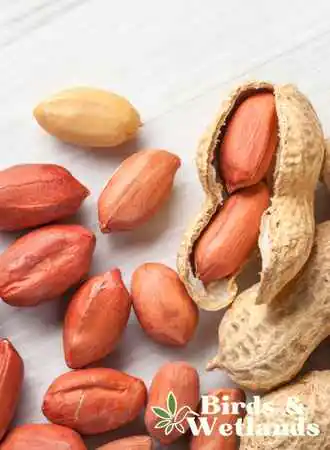
Do swans like peanuts?
Whether swans like peanuts or not is unclear. Peanuts is not part of the swan’s natural diet so it is considered an acquired taste.
Some swans at your local pond may eat peanuts if you offer them some. But not all of them may like the taste.
Can baby swans eat peanuts?
Baby swans have a natural diet in the wild consisting mainly of aquatic plants and small aquatic animals such as insects, crustaceans, and small fish.
Cygnets can start foraging for food on their own soon after hatching but will continue to rely on their parents for protection and guidance in finding food.
However, their digestive system is still developing and unable to handle a diverse range of foods. Therefore, it is important to be cautious when introducing new foods to young swans, as their bodies may not be able to digest certain items properly.
After four weeks from hatching, young swans can eat peanuts in moderation and chop or grind them into small pieces. It is important to monitor their reaction and digestion of the peanuts and adjust the quantity accordingly.
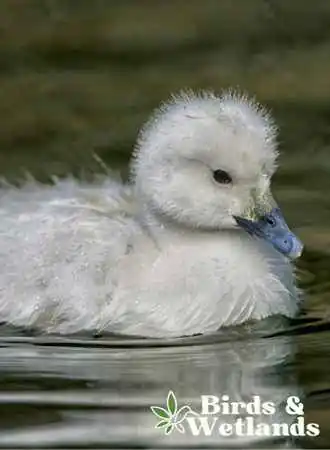
How to serve peanuts to swans
If you have a mute swan family in your local park, you may be wondering how you can serve them peanuts.
When serving peanuts to swans, it is important to ensure that they are unsalted and unroasted. Too much salt is bad for the health of these birds. These peanuts are safe for these wild birds to consume and provide them with the necessary protein and fat they need in their diet. It is also important to feed them in moderation, as too many peanuts can cause health problems such as obesity.
To serve peanuts to swans, it is best to crush or chop whole nuts into small pieces. This makes it easier for the swans to eat them and reduces the risk of choking. Additionally, it’s recommended to scatter them in areas where the swans forage for food rather than hand-feeding them.
Swans feed using their long necks in shallow water but don’t throw the peanuts directly there. Instead, scatter the peanuts on land.
It is also important to note that giving swans food can interfere with their ability to find food sources on their own, and it’s important to avoid creating dependency on human-provided food. It’s also important to check with local authorities if there are any regulations or recommendations regarding feeding wild animals.
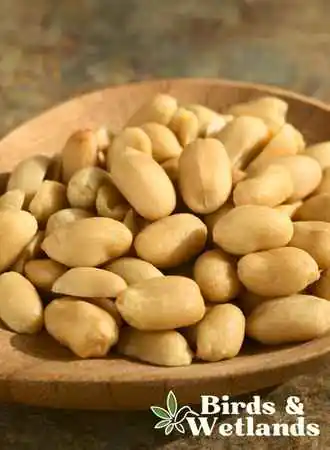
Are peanuts better than bread when feeding swans?
Swans are opportunistic eaters that eat food equivalent to about 25% of their body weight. Many people feed bread swans in many parks in North America. What most of these people overlook is that feeding bread may not be in the best interest of these majestic birds.
Feeding swans bread is not the best food choice for these birds as it lacks the necessary nutrients they need to thrive and can harm their health.
Bread can have a higher protein count and is often high in carbohydrates and is essentially empty calories for swans. This can lead to nutritional imbalances and can interfere with normal nutrition. Some swans may also experience crippling growth spurt.
Too much bread that contains refined flour and salty foods can lead to malnutrition and malformations of their bones and beaks. One of the most common issue of giving swans and other ducks bread is a condition called angel wing, which their wings grow incorrectly.
Other swans may become weak or possibly infertile. If they can produce offspring, they may be born unhealthy.
Furthermore, swans can become reliant on human-provided food, which can make them lose their natural foraging skills and cause them to become more aggressive toward humans.
Additionally, feeding swans bread can contribute to the pollution of local waterways and harm other aquatic life. Moldy bread can also attract pests such as rodents.
The only time bread can become beneficial to swans is during winter months or freezing weather.
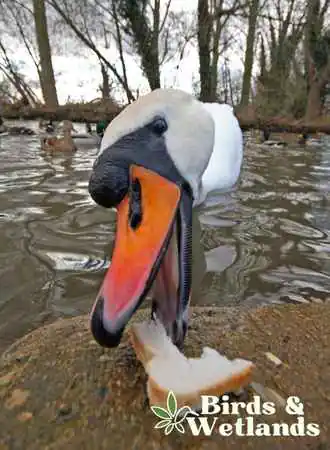
What nutritious food can you feed swans if they don’t like eating peanuts?
Swans and ducks eat peanuts but since nuts are not part of their natural, these birds may not like eating them. Swans prefer aquatic vegetation, short-cropped grass and animal matter such as small insects.
If swans do not like eating peanuts, several other food options you can feed naturally to these birds.
One option is to feed them a specially formulated waterfowl feed or duck food. These feeds contain a mixture of seeds, grains, and other ingredients specifically designed to meet the nutritional needs of waterfowl. They can be purchased at most feed stores or online.
Another healthy food option is to provide them with fruits and vegetables. Swans can eat peas, peas, corn, carrots, celery, alfalfa sprouts, chopped deseeded apples and other natural food. They also eat lettuce, cabbage and other leafy greens.
Young and adult swans eat potatoes and other vegetables, grains and unsweetened breakfast cereal. You can also feed them vegetable peelings.
These foods provide them with essential vitamins and minerals to stay healthy. It is important to note that fruits and vegetables should be washed and cut into small pieces to prevent choking.
You can also feed ducks, swans and geese fish meal, live or frozen insects such as mealworms, crickets, or earthworms. These insects are a great source of protein and are readily accepted by most waterfowl. These can be purchased from pet stores or online.
It’s important to note that feeding most animals with raw meat or fish is not recommended due to the risk of bacterial contamination.
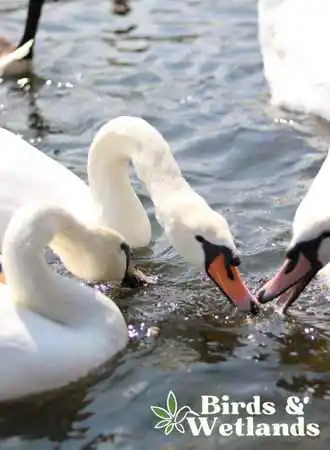
Other Foods for Swans
Best Waterfowl Feed
Delightful Feeding Experience
Transform your backyard into a scenic waterfowl habitat and enjoy an interactive feeding experience with Natural Waterscapes Waterfowl Floating Food.

Pros
- Nutritious Food: Natural Waterscapes Waterfowl Floating Food is specifically designed to provide essential nutrients to waterfowl, including swans, geese, and ducks, helping them maintain a healthy diet.
- Convenient: The food comes in resealable packaging, making it easy to store and use as needed. It is also easy to handle and transport.
- Floating Formula: The floating formula of the food allows it to remain on the surface of the water, making it easier for waterfowl to eat and minimizing the risk of water contamination.
- Attracts Waterfowl: The food is formulated to attract various waterfowl species, including swans, geese, and ducks, to your pond, lake, or other water body, providing an opportunity to observe and enjoy these beautiful creatures.
- Environmentally Friendly: Natural Waterscapes Waterfowl Floating Food is made with environmentally friendly ingredients and does not contain any harmful preservatives, making it safe for both waterfowl and the environment.
Cons
- Shelf Life: The food’s shelf life may be limited compared to other types of waterfowl food due to its natural ingredients and lack of preservatives. This means you may need to use it up quickly after opening the package to prevent it from going bad.

